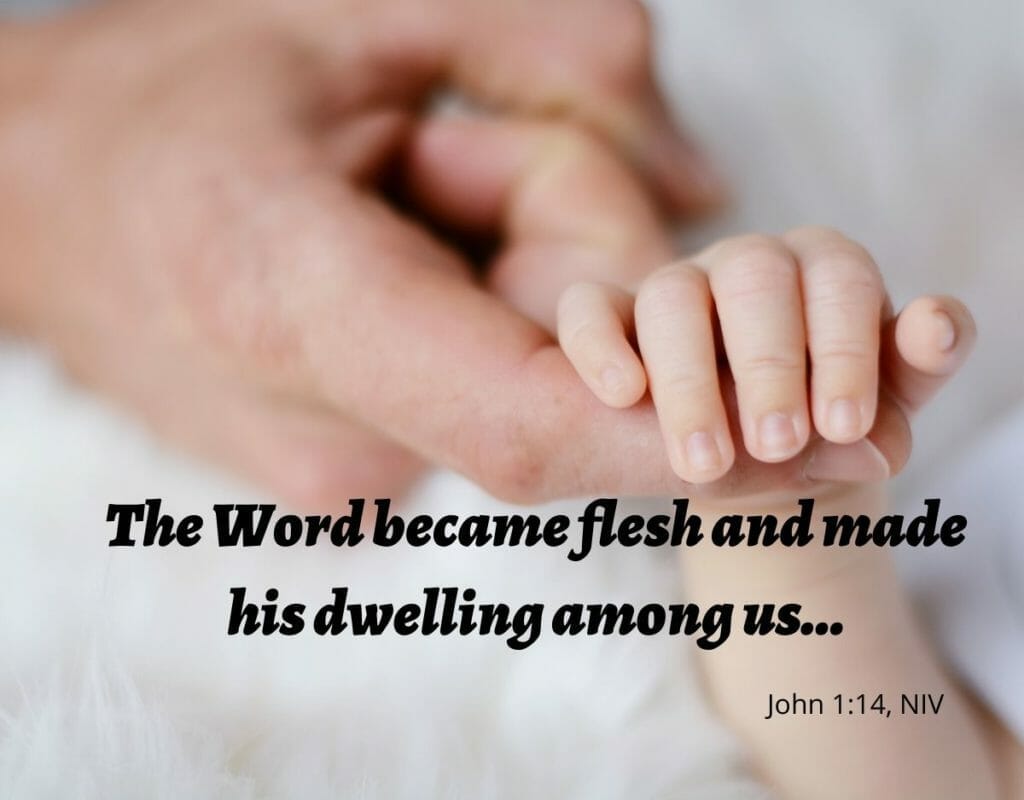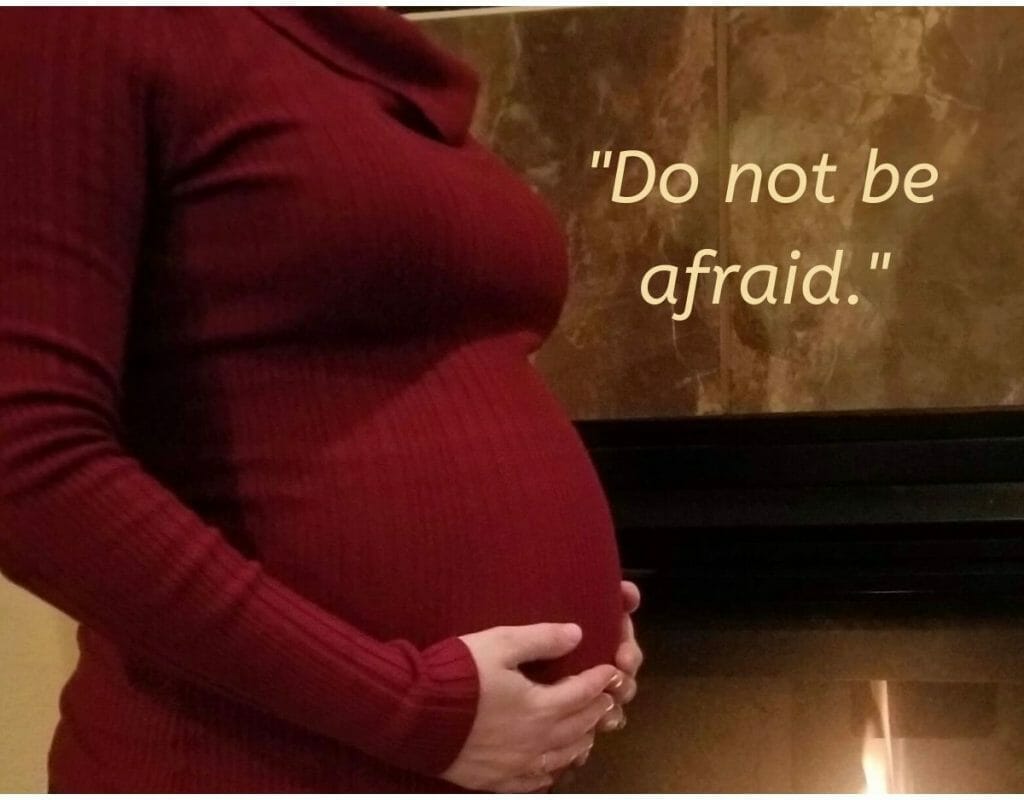I love babies!
BAbies and Christmas just seem to go together. Particularly one baby. So the carols tell us.
- “The Virgin Mary had a baby Boy. And they say that His name is Jesus.”
- “Hark the herald angels sing. Glory to the newborn King.”
- “Away in a manger, no crib for a bed. The little Lord Jesus lay down His sweet head.”
- “Mary did you know that your baby boy would one day . . . “
New life. New prospects. Innocence. Oh, and they are so downright cute! What excitement!

Maybe I’m thinking about babies so much because our family is about to welcome a little one. Like any parent or grandparent, my mind is a swirl of questions:
- Who will the baby look like?
- What will he become?
- How will this baby impact his world? What will he accomplish?
- Will he have to face difficulties, suffering, or hardships?
- Is Baby okay in there?
Maternity Musings
Since my side of the family carries a visual genetic defect, our concern over the health of the baby’s eyes is always near the top of our list of questions. We’ve come to terms with this disability and medical technology has provided improved intervention with each successive generation, but it’s still a concern.
Some families would consider not bringing a child into the world if they knew it would be born crippled, blind or severally mentally challenged. If you knew your child would suffer physically or mentally in a way that would prohibit the child from living a normal life, alter the course of the family’s life, or create a financial burden to the family and society, would you think twice about conceiving?
What if you learned of your child’s disability after you had conceived?
We live in a world today that makes it possible for parents to choose whether they will give birth to a disabled child. Or, in some cases, what they will do with the child after it is born.
A common debate when I was in college was over the issue of when abortion is acceptable. One compelling argument for abortion that college students used was this scary disease called TaySacs. My college friends didn’t know what it was, but all they knew was you don’t want your child to have it. With a bit of research, I found out that, while a debilitating disease, TaySacs is quite rare.
But the hidden message within the scare tactics was this: no mother wants her child to suffer. No mother wants to watch her child suffer. Today, a friend of child-bearing age tells me, every pregnant mom is required to have an expensive blood test to see if her baby might have certain diseases. This is done so she can have the option to abort her child, er, the fetus.
What’s scarier yet is that our world is moving toward the disposal of babies born with major health issues. Full term abortions are happening and occasionally, a story about the killing of a child already born sneaks into the news.
Why not? the proponents of abortion ask. Babies shouldn’t have to suffer.
Let’s be real. In the world, we will have tribulation, Jesus told us. It’s part of living between the two Gardens – Eden and Heaven – as Lysa TerKeurst, author of It’s Not Supposed To Be This Way puts it. The reality of our world is this: if a child isn’t born with a disease or disability, they might contract one later in life. What if all mothers received a look into the future as to what awful thing will happen to their offspring during childhood or later? How many women would say, “Oh I don’t want my child to endure that!” and end the pregnancy or choose not to conceive life at all?
One woman had that sneak preview.
Mary, the mother of Jesus, had an inkling of the suffering her child would endure. In Luke 2, Simeon the prophet told her, “A sword will pierce your own soul.” Jesus would suffer one of the worst executions the baser human nature can concoct. And Mary would be at the foot of the cross to watch her son’s most agonizing moments. I remember what a basket case I was when my child was injured for the first time, I can only begin to imagine the anguish Mary endured as Jesus hung on the cross.

Maybe she shouldn’t have had Jesus in the first place? If Mary had lived in the 21st century, there would be a few that would tell her, “Do this child a kindness and let it go now. ”Yet, despite the projected pain Mary would face, the angel Gabriel called her blessed among women. He told her, “Do not be afraid.” Why? Because Jesus’ suffering would bring the greater good of salvation to all people.
The best of life often costs the most.
As humans, we see the suffering and pain and we want to flee, protect, or fix the problem. Yet any mom of a disabled child will tell you of the joy their child brings – the smiles, the sense of accomplishment over small victories, the lessons in love without reservation. There is strength in the struggle, the bigger picture of accomplishment through striving, and the realization of what is truly important in life.
And any path of life is a walk of trust, trusting that God will bring us – and our children – through the tough moments, whether they occur at birth, in childhood, or at life’s end. We need not fear the near or far future, for God holds all it in His hands. He will walk with us through the darker moments and delights to shine His glory through the broken moments, shouting His strength through the whispers of our weaknesses.
Mary’s response was so appropriate:
“I am the Lord’s servant. May everything you have said about me come true (Luke 1:38).
I love the story about Tim Bailey. Tim, a mentally challenged young man, was a savant at one thing. He could play the piano. His hands would rip up that keyboard like nobody’s business. He couldn’t read music and his tunes were never the same twice, but oh could he play.
In between concerts, Tim once got a job at a restaurant playing the piano. But the manager was bothered by the number of hymns Tim played. “Cut out that religious stuff,” he told Tim. “Why not play showtunes and pop music?”
Tim stood and closed the piano lid. “If I can’t play for Jesus, I’m not playing at all,” he said. And he walked out.
“Do not be afraid.”

Tim’s action was such a testimony to to his and his mother’s faith in Christ. How many hundreds of people would be bereft of Tim’s encouragement if Tim’s mom had chosen to abort him? Or, equally tragic, if she had kept him hidden in a bedroom, complacent that Tim was just “born that way” and could never be more than he was? So many of us would miss the chance to witness to power of Christ in a human being.
So, when I look into the face of a baby, I think, “What does your future hold, little one? What will life dole out to you? Do not be afraid. You have a Savior who is Christ the Lord. He faced suffering too. He overcame it and through His power, you can too.”
As a mom, dad, or grandparent, we can watch the trials of our children with courage and trust. Abortion is a shortcut we don’t have to take, for God is bigger and stronger than the worst that life hurls at us. He made the best out of the worst for Jesus, He will do the same for us.
“Do not be afraid.” Why?
“Nothing will be impossible with God.”

Leave a Reply